Birmingham’s innovation district expands, rebrands

The Switch expands Birmingham’s innovation footprint beyond the walls of its growing Innovation Depot to include several city blocks around the startup incubator.
Velocity Accelerator companies start ‘boot camp’ at Birmingham’s Innovation Depot

Seven high-growth companies are one week into a 13-week intense “boot camp” of development that organizers believe is key component to the tech-sector economic development efforts to drive Birmingham forward. Velocity Accelerator introduced its seven cohort companies to the public this week. This is the third class of cohorts to go through the program at Innovation Depot. The companies range from startups to a 14-year-old business. What all of them have in common is that they’re established with a product and revenues and a diversity that is seen as part of the secret sauce that makes Velocity Accelerator work. “We intentionally don’t focus on one industry sector,” said Devon Laney, CEO of Innovation Depot. “I think it’s part of the strength of the program to have diversity in the industries and the sectors and to be able to attract companies from outside of Alabama to Birmingham and hopefully stay when they get done.” The past two Velocity Accelerator classes taught organizers that having companies at the same stage in their development was also important. “We wanted companies that were all at a very similar place – companies that all had revenue, they all had products,” Laney said. “They were all at a very similar stage so that the curriculum of the Velocity program would be applicable throughout the program at the same time to all of the teams so that they could move through the program sort of together, really, in a lot of ways, and progress at the same pace throughout the program.” This year’s cohort companies are: Fanboard was founded in Atlanta by Morgan Drake, Josh Fisher and James Simpson and marries augmented reality with live events like sports and concerts S(w)ervice was formed in Birmingham by Thomas Walker and Warren Wills and offers an on-demand auto maintenance solution with appointment bookings and vehicle valet services. Babypalooza is a Birmingham company founded by Cecilia Pearson that is a parenting platform where live events intersect with technology to make it easy for new, expectant and hopeful parents to access the products, people and parenting information they need most. Uptime Dynamics was founded in Birmingham by Thomas Smillie, Tom Woodruff and Maggie Belshe to redefine what a computerized maintenance management system can do for manufacturers. Need2Say was started in Birmingham by Oscar Garcia with the mission of helping you communicate what you Need2Say in your second language so that you will realize your full potential in school, work and daily life. Milk the Moment was founded in Nashville by Courtney “Coko” Eason and uses the MILK App, which rewards you whenever you refrain from using your phone in places or situations where we all could be a little more present, intimate, focused and safe. Fledging was formed in Birmingham by Weida Tan and Steven Robbins and produces premium electronics like storage products, such as its flagship product, Feather SSD (Solid State Drive) for Mac devices. Over the next several days, Alabama NewsCenter will feature each of the companies in this year’s Velocity Accelerator program. Laney said companies from all over the world applied to be part of the new Velocity Accelerator cohort, bolstered by the successes of the previous two classes. The initial Velocity Accelerator in 2017 had nine companies, three of which had raised additional capital by the end of the program and two more have done so since. In 2018, there were seven companies, five of which raised follow-on capital and two of them from out of state relocated and stayed in Birmingham. “We’re looking at this as economic development,” Laney said. “We see this as a pipeline of growth companies that we can help support, attract to Birmingham and retain.” Laney said the first two Velocity Accelerator cohorts took the $1.5 million invested in them and have leveraged that seed investment to raise more than $8 million and create over 70 jobs in the past two years. “The return on the investment from the private sector, I think, is phenomenal,” Laney said. Several of this year’s cohorts were well aware of the past success and cited it as a reason for wanting to participate in the intense Velocity Accelerator program. “I’m proud of the history,” Laney said. “I’m glad that now we have something to build on and that other entrepreneurs and other startups can see the history and say, ‘Yes, I want to be in Birmingham. Yes, I want to go through Velocity because I understand the potential I have there to grow my business.’” The 2019 cohort kicked off Jan. 28 and concludes April 30 with Velocity Demo Day at Iron City, where each company will pitch to potential customers, investors and community supporters. Participants in the program receive $50,000 each from the Velocity Fund, which is supported by Alabama Power, Regions Bank, BBVA Compass, Blue Cross and Blue Shield of Alabama, Protective Life, UAB, the Community Foundation of Greater Birmingham, Encompass Health, EBSCO, Brasfield & Gorrie, McWane, Altec and Hoar Construction. Laney said the support from the private sector is part of the buy-in that has been critical to the program’s success. “The program is great. The curriculum is great. We’ve done a good job with all of those things, I think,” Laney said. “The community support and the buy-in from the community is the reason that Velocity is successful.” Having the corporate community provide dollars and not just lip-service of support is a key to creating a sustainable innovation economy, Laney said. “It speaks volumes. It’s a difference-maker for us.” Republished with permission from Alabama NewsCenter
Alabama’s largest county looks to continue economic development momentum
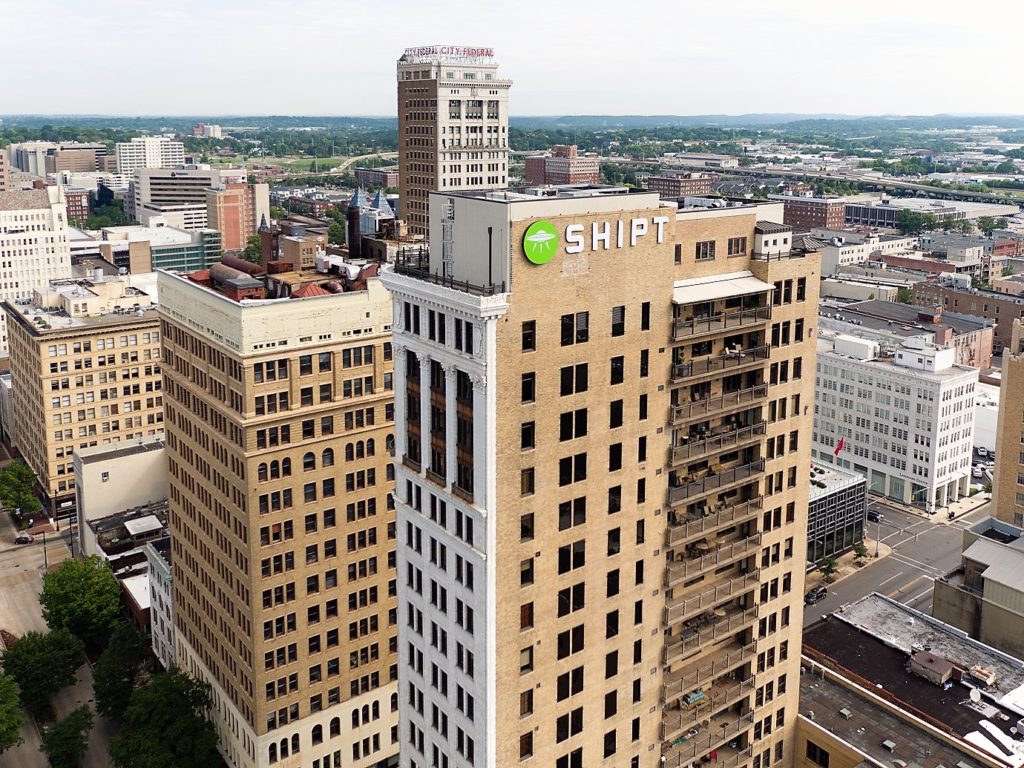
With the recent announcements of thousands of jobs coming into Jefferson County in connection with Amazon’s advanced robotics fulfillment center, DC BLOX’s data center and Shipt’s decision to keep its corporate headquarters in Birmingham, local officials are working from a playbook that has four steps, they say. It all begins with Alabama’s business climate that has been ranked as best in the United States for growth potential and workforce training by Business Facilities magazine, said Commissioner David Carrington, chair of the county’s Finance, Information Technology and Business Development Committee. The second is that Jefferson County is the economic center of the state, with the largest population and number of jobs. In 2016, companies announced they were going to create 14,500 jobs and invest $5.1 billion in Alabama. The Birmingham-Hoover metro area accounted for about 20 percent of those jobs and 25 percent of the capital investment. Jefferson County alone was responsible for 1,436 announced jobs and $506 million in capital investment. “In fact, the metro area’s gross domestic product is greater than Mobile, Montgomery and Huntsville combined,” Carrington said. “In 2017, according to the Alabama Department of Commerce, Jefferson County led the state with 2,200 new announced jobs in targeted industries.” The next step is collaboration among partners that often include the Birmingham Business Alliance (BBA), University of Alabama at Birmingham (UAB) and, if a proposed site is in a city, the city. “As in most successful projects, it was a well-coordinated community effort that led to a successful conclusion, and we’re very grateful to our partners and allies for their great work on this project,” said Lee Smith, East Region CEO for BBVA Compass and 2018 chairman of the BBA, after the area secured Amazon’s $325 million investment. “The county actively listens to the prospect’s needs and then participates in the development of an aggressive marketing plan with (those) partners,” Carrington said. Fourth, a project team is in place that “leverages our community’s assets,” Carrington said. “. . . We will talk about our enviable road and rail transportation network when talking to a distribution company; or UAB, Southern Research and Innovation Depot when talking to a STEM (science, technology, engineering and math) company; or our central, geographic proximity to Mercedes, Honda, Hyundai, Volkswagen, Kia and the soon to be open Toyota/Mazda plants when talking to an automotive supplier.” All of those steps are done under a positioning umbrella, he said. “Even if we don’t win a project, we want the company and their consultants to ‘have a good feeling’ about the community so we will be considered for a future project,” he said. Carrington pointed to the community’s Amazon HQ2 “BringAtoB” campaign. “The primary project team knew that Birmingham was at best a long shot, but, despite the odds, we put together an innovative vision and proposal for the company to consider,” he said. “While we didn’t win the headquarters, we caught Amazon’s attention and less than a year later announced an 855,000-square-foot advanced robotics fulfillment center in Bessemer.” Republished with the permission of the Alabama Newscenter.
Analysis: Alabama bioscience industry’s impact tops $7.3 billion a year
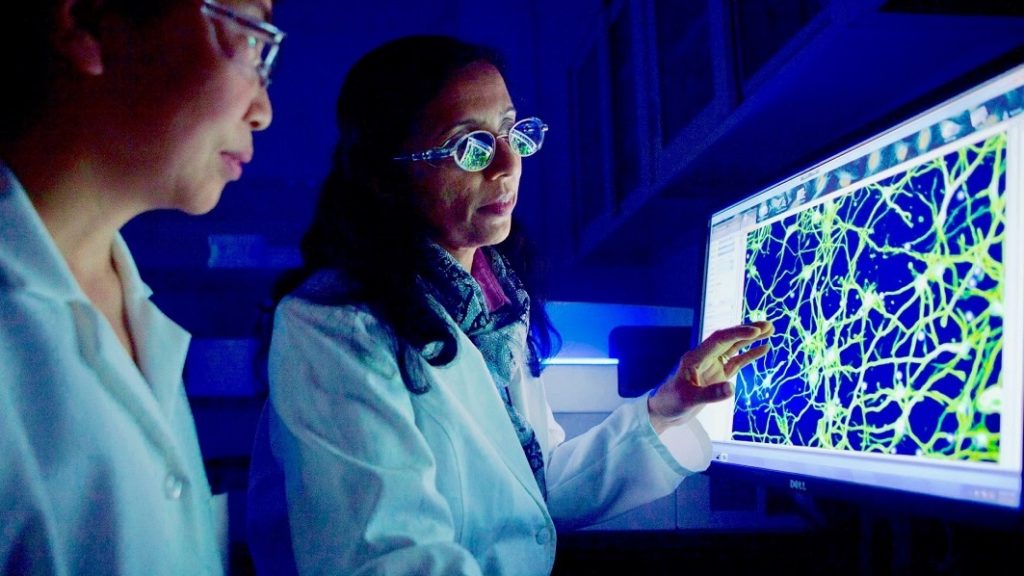
Alabama’s multifaceted biosciences industry generates $7.3 billion in economic activity annually while supporting 780 companies and nearly 48,000 direct and indirect jobs across the state, according to a new analysis by researchers at the University of Alabama. The comprehensive study underscores the contributions and growth potential of the statewide life sciences sector, a robust combination of research institutions, medical labs, innovative startups, international pharmaceutical manufacturers and more. “We have exceptional strengths in biosciences, including world-class research organizations and a roster of cutting-edge companies, so it’s a natural growth area for the state,” said Greg Canfield, secretary of the Alabama Department of Commerce. “We’re committed to helping accelerate the development of the life sciences sector, and we want the state to become home to more of these high-paying jobs and the talented individuals to fill them,” he added. Massive impact The analysis, conducted for the BioAlabama industry trade group, shows that Alabama’s 780 life sciences companies directly employ 17,871 workers, each earning an average annual salary of $67,664. Total expenditures of those companies exceed $3.8 billion a year. Other key findings in the University of Alabama report: The bioscience industry’s 47,980 direct and indirect jobs in Alabama support a total yearly payroll of $2.3 billion. The industry contributes $3.9 billion annually to Alabama’s gross domestic product (GDP), nearly 2 percent of the state’s total economic output. The industry’s earnings impact generates $161.4 million in tax revenue annually, including $74.7 million in state income taxes and $86.7 million in state and local sales taxes. In addition, the UA researchers examined the economic contributions of bio-industries such as agricultural feedstock and chemicals, and bioscience-related distribution. They found that these activities magnified the impact of the core life sciences sector in Alabama, elevating overall economic output to $11 billion a year with more than 70,000 jobs and annual tax revenue topping $233 million. “This analysis confirms the far-reaching impact of Alabama’s bioscience industries throughout the state, and demonstrates why we continue to pursue strategies that allow the sector to continue to grow and create even more high-caliber jobs across the state,” said Blair King, president-elect of BioAlabama and manager of economic development and existing industry at Alabama Power Co. Diverse activities The foundations of Alabama’s bioscience research rest on the work conducted by the University of Alabama at Birmingham (UAB), Southern Research, the HudsonAlpha Institute for Biotechnology, and the University of South Alabama’s Mitchell Cancer Institute. The specialties of these organizations include drug discovery and development, genomics, and personalized medicine. They also frequently engage in collaborations such as the Alabama Drug Discovery Alliance, a partnership between UAB and Southern Research that has developed a pipeline of potential therapeutics for diseases such as cancer and diabetes. Alabama is also home to multinational companies involved in pharmaceutical and medical device manufacturing. In March, Germany’s Evonik, for example, announced plans to expand production of biomaterials and launch a Global Competence Center for Medical Devices at its Birmingham facility. “Evonik’s investments in the Birmingham site reflect its commitment to the medical device and drug delivery business as well as the city of Birmingham and its history of world-class medical research and technology,” said Kel Boisvert, Birmingham site manager for Evonik. Other manufacturers operating in the state include Kowa Pharmaceuticals (Montgomery), Nektar Therapeutics (Huntsville), Baxter and Pharmavite (both Opelika), and Oxford Pharmaceuticals, Avanti Polar Lipids and BioHorizons (all Birmingham). At the same time, a number of innovative startup companies have sprung up in Alabama, with many of them based at HudsonAlpha and Birmingham’s Innovation Depot, the Southeast’s largest technology business incubator. Promising startups include Birmingham’s Blondin Bioscience, Huntsville’s GeneCapture, Mobile’s Swift Biotech and Auburn’s Vitruvias Therapeutics. “We are fortunate to have started our business in Alabama because we have benefited from the highly collaborative entrepreneurial spirit throughout the state, including Alabama Launchpad and the various Small Business Development Centers, and especially our connection with HudsonAlpha and the University of Alabama in Huntsville,” said BioAlabama President Peggy Sammon, CEO and co-founder of GeneCapture. “We have been able to find highly skilled molecular biologists, chemical engineers, optical engineers and lab specialists,” she added. “Our membership in BioAlabama has connected us with other scientists and business professionals who have significantly helped us advance our business plan.” Alabama’s research universities are key players in the bioscience ecosystem and contribute to the industry’s economic impact. The network includes Auburn University, USA, Tuskegee University, Alabama State University, Alabama A&M University and the three University of Alabama System campuses. The analysis is the first to comprehensively examine the economic impact of the state’s bioscience sector. It was prepared by Senior Research Economist Sam Addy, Ph.D., and his team at the Center for Business and Economic Research at the University of Alabama’s Culverhouse College of Business, with assistance from BioAlabama. Addy noted in the report that investing in life sciences should remain a pillar of the state’s overall economic development strategy. “Alabama should continue to keep biosciences as a focus in its economic development strategy since these industries provide high-wage jobs and are highly productive,” he writes. What others say “Since launching its cancer program in 1946, Southern Research has discovered seven FDA-approved oncology drugs and made many significant discoveries that have helped patients with cancer and other diseases,” said Art Tipton, Ph.D., president and CEO of the Birmingham nonprofit. “This highlights the vital importance of the groundbreaking bioscience work that continues to be done in labs in Alabama.” “I see UAB as not only the hub for healthcare innovation in Birmingham, but definitely throughout the state and the region,” said Kathy Nugent, Ph.D., executive director of UAB’s Harbert Institute for Innovation and Entrepreneurship. “That means producing as many companies as possible. It’s harder to produce biotech companies, because it takes time to develop new drug therapies. What we’re trying to do is think about it strategically and give our faculty the resources they need to be entrepreneurial to turn their research into new life sciences ventures.” “HudsonAlpha has gone from just a handful of startups and faculty to more than 35 life sciences companies and 15 faculty investigators in just 10 years,” said Carter Wells, vice president for economic development at HudsonAlpha. “It goes to show that Jim Hudson and Lonnie McMillian’s model works, and we’re proud
Innovate Birmingham prepares students for tech jobs
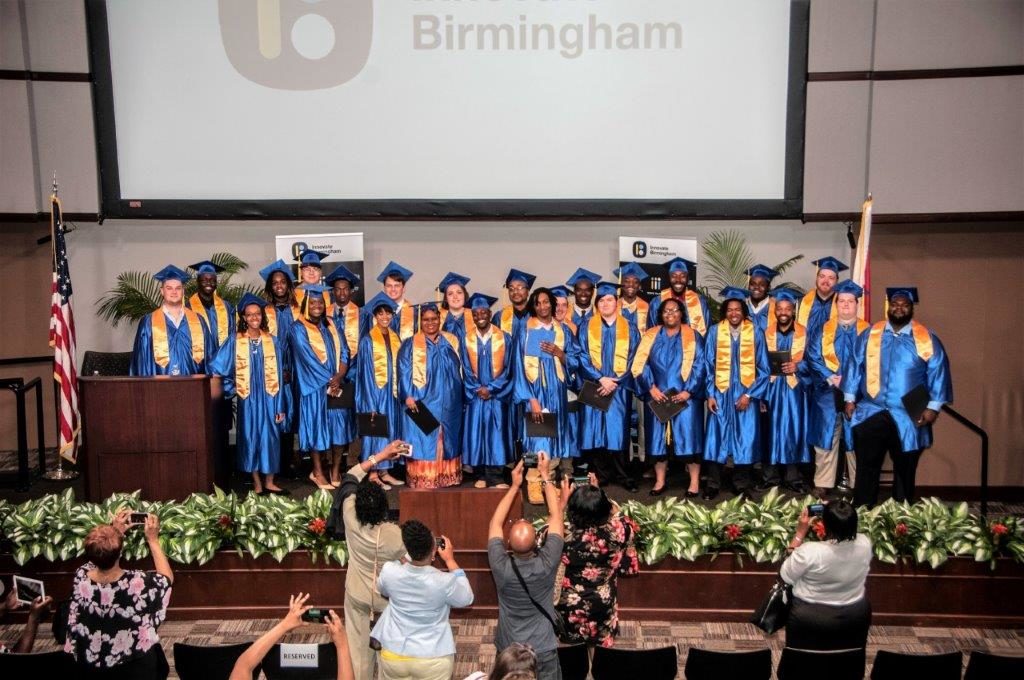
The 28 graduates of an Innovate Birmingham program are “the full definition of getting it right” according to Birmingham’s mayor and “how workforce development is supposed to work” according to an Alabama Power executive. The graduates were feted at a commencement ceremony at Alabama Power corporate headquarters on April 13 where UAB President Ray Watts presented them with their certificates. Each quarter, the Innovate Birmingham Development Program prepares students for careers in Birmingham’s growing tech sector through training via the I AM BHAM coding bootcamp and Generation IT bootcamp. Friday’s class was the fourth graduating class in the program. Innovate Birmingham holds graduation for tech students from Alabama NewsCenter on Vimeo. I AM BHAM, a 14-week program, offers short-term, fast-track, intensive training for full stack and front-end web development. The 12-week Generation IT program offers an IT specialist training program for students to receive their CompTIA A+ certification. Both programs, held onsite at Innovation Depot in Birmingham, allow students to interact daily with potential employers. More than 25 employers – including corporations such as Alabama Power, BBVA Compass, Regions Financial and Protective Life – support the program and offer graduates jobs. John Hudson, senior vice president of Marketing and Business Development at Alabama Power, said a program that can take someone who was unemployed, train them in a new skill and promise them a job upon graduation “is how workforce development is supposed to work.” “All of us who work on economic development in Birmingham are trying to move this community and this city toward a more technology-based economy,” Hudson said. “If we’re going to do that, workforce is going to continue to be prominent in us getting there.” Birmingham Mayor Randall Woodfin said the Magic City’s economy is hitched to growing the technology industry. “As we look at what our strengths are and what our strengths can be, IT technology and innovation is something we need to triple down on and have a full investment in,” Woodfin said. He said economic development is ultimately an investment in people and the Innovate Birmingham program epitomizes that idea. “This is a full definition of getting it right,” Woodfin said. Watts said the program is an extension of UAB’s mission. “As we looked at the needs in Birmingham, we realized there was a subset of our young people who have not had the opportunity yet to be in the right place at the right time to develop those educational skills,” he said. The program was made possible, in large part, by a $6 million grant from the U.S. Department of Labor. Josh Carpenter, director of the Birmingham Office of Economic Development, was instrumental in constructing the partnership that pursued that grant when he was at UAB. He was at the commencement. “Sustaining the economy through a qualified and diverse workforce is absolutely fundamental to our success in creating the innovation of the future,” Carpenter said. “This is laying a pipeline for us to be able to showcase around the country that we have a best-in-class program that can train people and equip them with the skills they need to succeed very quickly in a workforce that demands more nimble and qualified talent.” Watts said he was doing more than handing graduates their certifications: He was handing them a better Birmingham. “It’s a great opportunity to give our young people skills and knowledge that will allow them to get a really good job and provide for their families, and help their neighborhoods and the entire city be successful,” Watts said. Republished with the permission of Alabama Newscenter.
Deadline near for ‘Rise of the Rest’ Birmingham startup competition for $100,000

Birmingham area startups have only a few days left to be considered for a $100,000 investment from “Rise of the Rest” founded by Steve Case. Birmingham is among five cities chosen for the America Online founder’s latest initiative aimed at championing innovation ecosystems in the U.S. The Rise of the Rest bus tour arrives in Birmingham May 9, but the deadline for startups to apply for the six-figure prize is March 20. Interested companies are encouraged to go to the website and apply. Birmingham Mayor Randall Woodfin said having Rise of the Rest in Birmingham is great exposure for what is happening in the Birmingham entrepreneurial scene but the $100,000 could make a major difference for a company on the rise. “This is an amazing opportunity for local startups because now we get a chance to highlight and showcase what they’re already doing so well,” Woodfin said in the video below. “They deserve national exposure.” The tour stop in Birmingham also features Google for Entrepreneurs, a longtime Rise of the Rest partner, which will provide coaches to help startup founders with their investment pitches. Republished with permission from the Alabama NewsCenter.
Target deal for Shipt showcases Birmingham’s dynamic tech sector
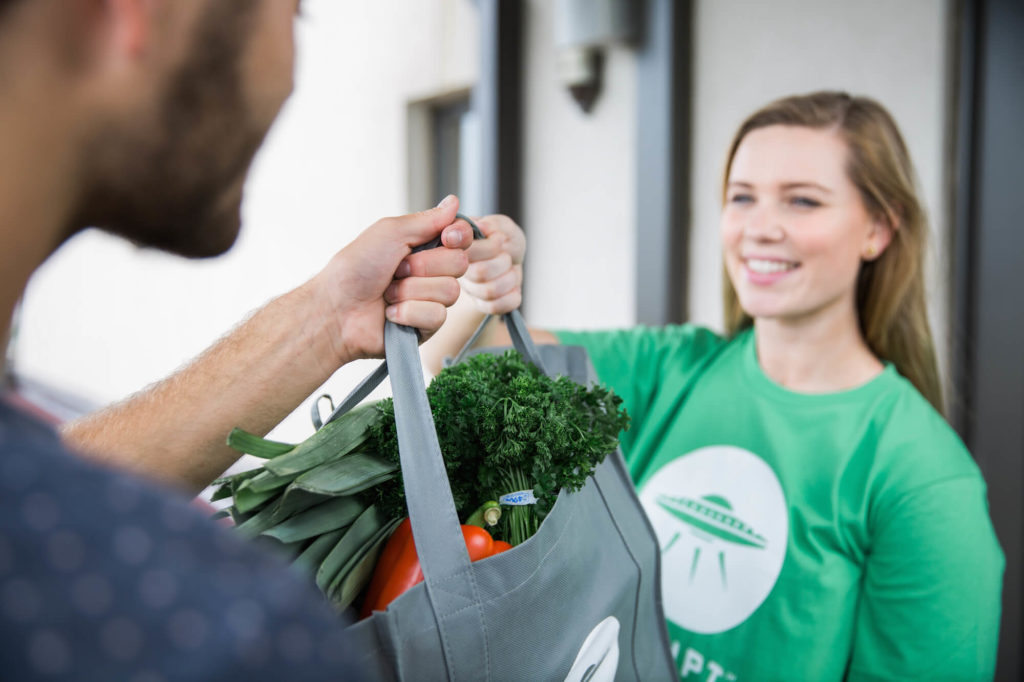
The vibrant entrepreneurial tech scene in Birmingham is once again in the national spotlight, as Target plans to buy local grocery delivery service Shipt for $550 million in a blockbuster deal. The retail giant, which announced the acquisition in December, said it will have a major impact on efforts to increase convenience for Target shoppers through affordable, same-day delivery across a variety of product categories. For Birmingham, the move is the latest win for the city’s burgeoning innovation sector, which has attracted millions of dollars in new investment for tech-based startups. “Birmingham is a center for innovation and this agreement highlights the type of cutting-edge industry that is emerging here,” said Jon Nugent, vice president for innovation and technology for the Birmingham Business Alliance. “Through the success of companies like Shipt, Birmingham continues to reinforce its presence as a destination for entrepreneurs looking for a smart, modern city where they can build and launch the next generation of technology companies.” Vibrant scene Shipt has grown rapidly since its founding in Birmingham in 2014. Members of the service use an app to connect to a network of more than 20,000 personal shoppers, who fulfill orders from various retailers and deliver within hours in more than 72 markets. Nugent credited Shipt’s leadership for recognizing what Birmingham has to offer startups. “Bill Smith and Jeff Smith are truly visionary business people who recognized the incredible value in Birmingham’s people, community and commitment to its entrepreneurs,” Nugent said. “Their investment in Shipt’s employees, their neighborhood and their corporate headquarters represents a standard of excellence that continues to be recognized across the United States and internationally. “They continue to be an integral part of this vibrant community that, through the twin discovery engines of UAB and Southern Research, are launching new and innovative companies at an incredible pace.” Opportunities Innovation Depot is a hub of much of the activity. The downtown Birmingham business incubator is home to more than 100 companies, which recorded $126 million in gross sales in 2016. The five-year economic impact of the facility is estimated at more than $1.4 billion. Meanwhile, other technology-based startups have turned heads among major investors, and shepherding more firms like them is a priority in Birmingham and across Alabama. Innovation Depot’s Velocity Accelerator is designed to accelerate development of idea-stage companies, while Alabama Launchpad, a program of the Economic Development Partnership of Alabama, has invested $4 million in companies that have created more than 500 jobs and go on to raise $50 million in follow-on funding. “It’s a great time to be an entrepreneur in Birmingham and Alabama, especially a technology-based entrepreneur,” said Greg Canfield, secretary of the Alabama Department of Commerce. “With a skilled and creative workforce, growing funding and mentorship opportunities, and a history of advanced research and developments, the city and the surrounding region have all of the ingredients to help startups thrive.” Ambitious goals As for Shipt, it will be a wholly owned Target subsidiary and will continue to run its business independently. Target will look to Shipt to help achieve ambitious goals set last year that focus on giving customers a number of convenient ways to shop, said John Mulligan, executive vice president and chief operating officer for the retailer. “With Shipt’s network of local shoppers and their current market penetration, we will move from days to hours, dramatically accelerating our ability to bring affordable same-day delivery to guests across the country,” he said. “By the 2018 holiday season, we will be servicing every major market across the country with same-day delivery, and Shipt’s service-oriented approach aligns well with Target’s commitment to delivering an exceptional shopping experience for our guests.” Shipt founder and CEO Bill Smith said the company is excited to partner with Target and is eyeing additional expansion. “Partnering with Target and the national scale they provide allows Shipt to further accelerate our growth, bringing our service to more people, in more markets across the country,” he said. “We’ll continue growing our marketplace and membership base, working with a variety of retailers to drive scale and efficiencies. We look forward to introducing Target guests to the convenience of our same-day delivery services, with the level of personal attention only Shipt can provide.” This story originally appeared on the Alabama Department of Commerce’s Made in Alabama website. Republished with permission from the Alabama NewsCenter.
EDPA projects new image with Birmingham HQ, digital wall
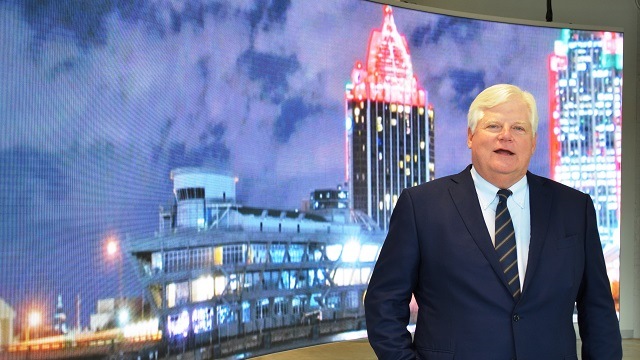
For years, the Economic Development Partnership of Alabama had a bird’s-eye view of the state’s largest city. From its home on top of Red Mountain in the august-sounding World Business Center, EDPA projected an image befitting Alabama’s only statewide private economic development entity. In January, EDPA came down from the mountain, planting its new headquarters at ground zero of Birmingham’s modern renaissance. From the former Merita bread bakery (now the Bakers Row development), EDPA neighbors Railroad Park and Regions Field at the corner of First Avenue South and 14th Street. EDPA is now a street-level organization and everything from the new headquarters’ décor to its 34-foot-long video wall speaks to the change. “Moving down here is as much about image as it is anything,” EDPA CEO Steve Spencer said. “This part of town is becoming the hub of activity.” When EDPA or the Alabama Department of Commerce are hosting a prospective company at a meeting in the new EDPA facility, Spencer said the story of what’s happening outside the building is apparent but so are the multiple successes playing continuously on the video screen. “When companies come here and visit, we want them to get an impression that this is what it’s like,” Spencer said. And companies are visiting and leaving impressed. “We’ve got some great companies looking at the state right now,” Spencer said. “We, of course, work in concert, with (the Alabama Department of) Commerce. We don’t compete. We don’t do the same things. We support them, they support us. We work together very well.” From Innovation Depot on the other side of the railroad tracks to UAB two blocks to the south, EDPA’s new location helps paint a picture for the kind of companies the city and state are looking to attract. “We’ve got two or three companies looking at the state right now that are high-tech companies,” Spencer said. “All it will take is one and that opens the door, just like Mercedes opened the door for the automotive industry. We just get one, and it will open the door for that entire industry, that entire segment to come to Alabama.” As impressive as the location is in Birmingham, Spencer said there are similar hubs of activity in a number of states throughout the state and they can tell that story, too. “This is kind of the way you attract people now. Our objective is to get people to move to the state,” he said. “Now, getting companies to move here is great, but getting people to move here is how you get companies to move here.” By literally projecting success on 320 square feet with more than 1 million pixels, the state’s successes are on full display 24 hours per day. “This was our way of being able to project – in a little bit of a dramatic way – what’s going on in the state,” Spencer said. “And it projects out into the street. You don’t have to be in a meeting in the building to see it. In fact, that’s not what it’s for at all.” Spencer said EDPA is seeking additional footage that helps tell the state’s success stories from manufacturing to research to food and culture. Republished with permission of Alabama NewsCenter.
Venture for America draws best and brightest to Birmingham
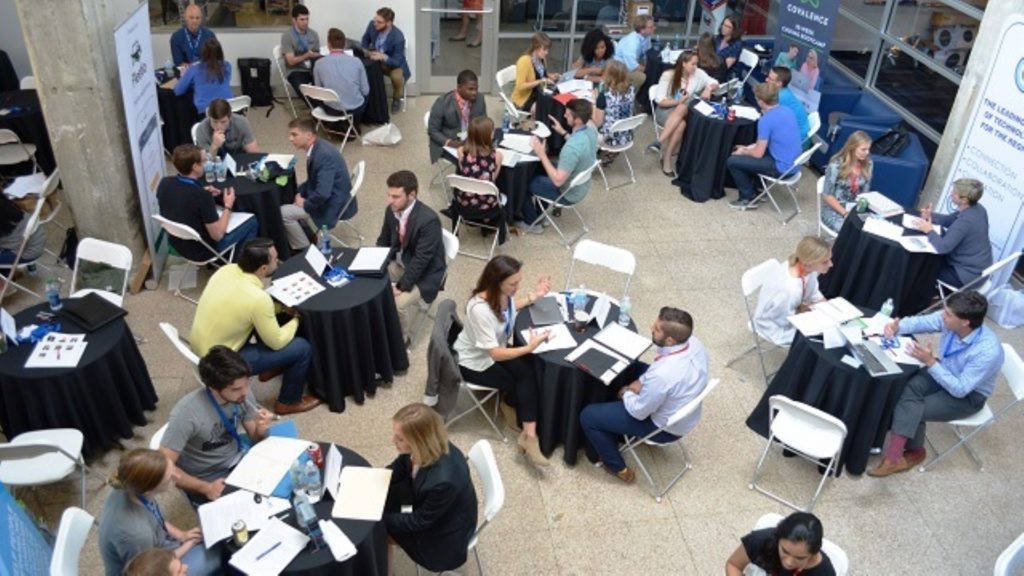
More than 40 companies from Birmingham, San Antonio, New Orleans and Nashville were in Birmingham Friday hoping to hire one of 50 Venture for America fellows. Innovation Depot hosted the VFA regional job fair, making Birmingham the center of innovation attention for at least a couple of days. “We have screened more than 2,000 young people in the country this year and selected the 200 best and brightest and brought a good cross-section of them here today,” said Amy Nelson, managing director and incoming CEO of New York-based Venture for America. VFA fellows come from some of the most prestigious universities in the country. For startup companies or companies with a focus on innovation, it can be hard to visit all of those schools on career day, so VFA holds regional events bringing select students to one place. Fellows vie for a two-year apprenticeship with the companies. Once the two years are up, the company may offer to keep the fellow on or a fellow may look to pursue starting his or her own company. “We’ve seen an uptick each year in the number of companies wanting to hire VFA fellows,” said Devon Laney, CEO of Innovation Depot. “And from the VFA fellows themselves who have moved to Birmingham, they tell us over and over and over how excited they are about being here, how much they’ve enjoyed their time and the fact that they’re going to stay.” On Friday, the companies held speed interviews. Fellows had 20 minutes to interview with each of as many as eight companies in hopes of finding a fit and an offer. Landon Acriche is ending his two-year VFA fellowship with Alabama Power, where he works as an innovation strategist. He was one of eight fellows who were part of the first Birmingham VFA program two years ago. Acriche was on the other side of the table Friday helping interview potential fellows and telling them about Alabama Power. “They’re making the decision difficult for us,” Acriche said. “Everyone who comes through VFA is very qualified and so everyone we’re speaking to is very interesting and has a lot of great experience.” Acriche said he tells them about the opportunities to learn about all aspects of the business at Alabama Power but also how the company supports new ideas and areas of innovation. And what does he tell them about Birmingham? “I’m telling them it’s awesome,” he said. “They’re coming to the conclusion that we all love it here.” Jared Weinstein, a New York venture capitalist who attended Mountain Brook High School, has also been singing the praises of the Magic City. He approached Nelson a couple of years ago and asked if VFA would consider Birmingham among new cities for a regional job fair. “I was skeptical, to say the least,” Nelson said. “It’s a smaller city. We work in Cleveland, Philadelphia, Baltimore – which, they’re a little bigger, a little more established in terms of entrepreneurship.” But Weinstein encouraged her to visit Birmingham. Alabama Power officials showed her around the city and Innovation Depot companies told of the great things happening in the area. “Just the welcome and the energy – it was a no-brainer,” Nelson said. “By the end of that day, we were totally sold.” For the fellows, Nelson said the decision of where to go for their fellowship is not one they take lightly. “When you’re a young person, you want to be part of a winning team and part of a team that’s growing,” she said. “If you are able to join up with a group of like-minded individuals and see that progress, then your work is meaningful to you and that keeps you coming back.” Republished with permission of Alabama NewsCenter.
Birmingham’s Velocity Accelerator inaugural class member: Glow

As a mother of three and a former corporate employee, Yazmin Cavale knew how inconvenient it was to try to schedule an appointment at a beauty salon and then try to make it there at the scheduled time. What she didn’t know until she left that job and started doing hair and makeup was just how much other women were wanting the same convenience. Cavale increased clients from 25 to 150 in the first year and then began to wonder how she could create a better way of bringing beauty. Glow is an app-based business that allows women seeking hair makeup or spray tans from “Glowpros” to schedule a time when the professionals can come to the client at the customer’s convenience. Glow has been called “the Uber of beauty” because of both its convenience and the fact that Glowpros can work for Glow while maintaining their regular job. Glow is the only female-owned startup in the inaugural Velocity Accelerator program at Innovation Depot. Velocity Accelerator is a 12-week program designed to give a select group of startups focused mentorship and guidance to speed their growth. The inaugural class of 10 companies was announced in December and started in January with $50,000 in seed capital. The program concludes with Demo Day on April 18. Cavale said Glow launched in November and already has 150 customers per month. Plans are to grow into new markets after Demo Day. Republished with permission of Alabama NewsCenter.
Birmingham Business Alliance shares 2016 progress, outlines plans for Innovate Birmingham
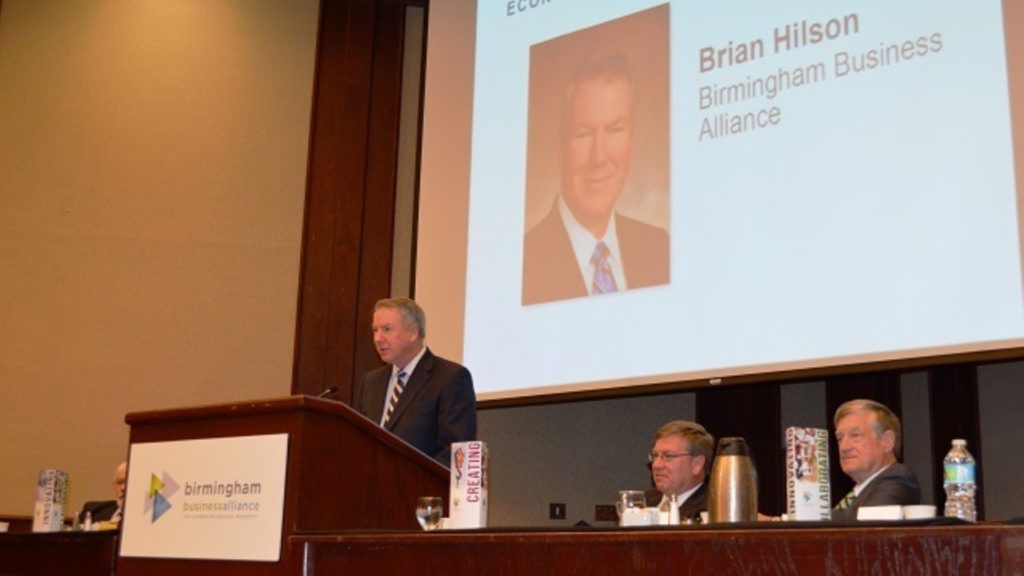
The Birmingham Business Alliance announced 75 projects with 2,014 jobs and $586.5 million in capital investment in 2016. The BBA unveiled its annual report at its 2017 Regional Economic Growth Summit this morning. The meeting also outlined details of the new Innovate Birmingham initiative and updated the progress Birmingham is making compared to 14 peer cities in 12 key indicators. Manufacturing remains the key industry category by all measures. It accounted for 51 percent of the projects, 49 percent of the jobs and 75 percent of the capital investment announced in 2016. “Manufacturing’s sustaining us,” BBA CEO Brian Hilson said. “As you see, the vast majority of the jobs and in particular the investment is driven by manufacturing.” Hilson said he expects manufacturing and distribution will continue to play a key role in the region’s economy. The future, however, is in growing through innovation with technology and knowledge-based industries. “I think we made substantial progress in areas that don’t show up in the numbers for 2016,” Hilson said. “I’m talking about technology-based business growth. If you look at all of the things that we worked on during the year – and at the top of that list, of course, is Innovate Birmingham and the physical development of the Innovation District – but also the workforce development plans for Innovate Birmingham.” Innovate Birmingham is an initiative that centers on the Innovation District surrounding Innovation Depot in downtown Birmingham. The groundwork has been focused on giving the district the electrical and fiber communications infrastructure necessary to accommodate future growth. On parallel tracks have been boosting the access to financial capital, developing needed workforce skills and recruiting like industries to the area. “We’ve made progress in positioning Birmingham as a technology center that have only started to show up in a few of the company announcements – companies like Oxford Pharmaceuticals, Steris, Evonik and others,” Hilson said. “I think we’re really only on the cusp of what’s actually going to happen with our organic growth that is both in the Innovation District but also outside of it like Evonik is today.” Hilson said he expects to see Birmingham continue to enjoy growth in areas like automotive parts and distribution but future growth will be in those industries identified in the Innovate Birmingham initiative. Birmingham Mayor William Bell said Innovate Birmingham is getting the emphasis from the public and private sectors. “I think the key is going to be the technology infrastructure that we’re working on through Innovate Birmingham,” he said. “We’re working with several consultant groups to make sure that every step that we take moves us in the right direction. The collaboration with the private sector as well as the governmental sector is yielding great benefits for us.” Ray Watts, president of UAB and BBA chairman, said the community is harnessing what UAB, Southern Research and Innovation Depot have to offer in making Innovate Birmingham a reality. “We want to create an opportunity, an environment for technology and knowledge-based economies to thrive here,” he said. “It is a movement and it’s a movement that has everybody involved in leading Birmingham working together and supporting it.” Hilson said the latest metrics show Birmingham improved in nine categories, was unchanged in two and declined in one when compared to 14 peer cities throughout the country. As for 2017, Hilson said announcements already made this year and other ones in the pipeline could make this a banner year. “This could be our best year in quite some time,” he said. Republished with permission of Alabama NewsCenter.

